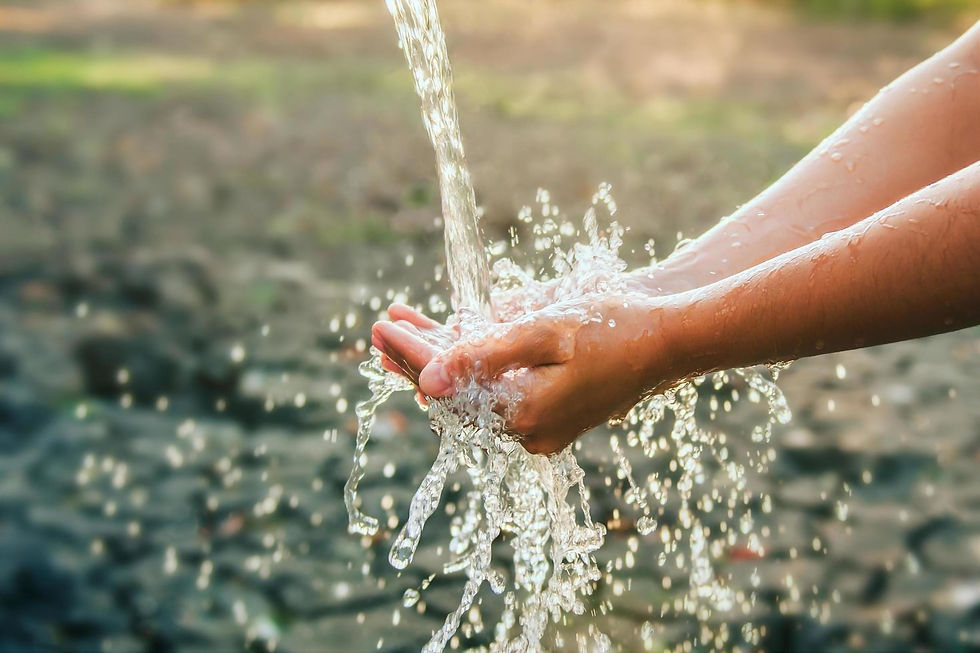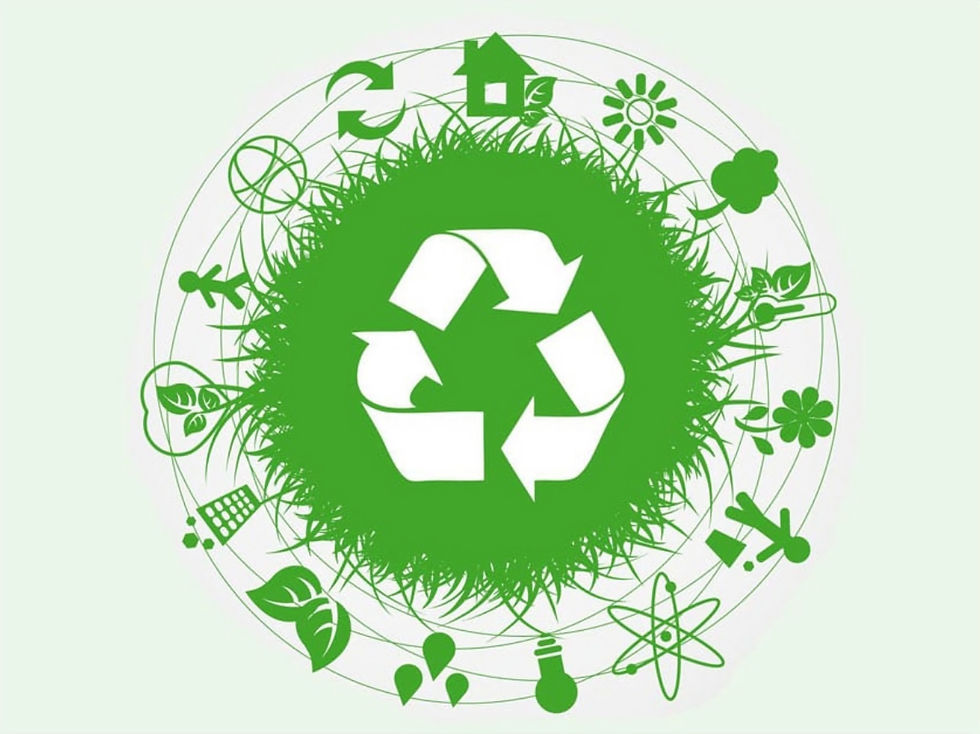10 WAYS TO SAVE WATER
- Food & Drinks Tips Team
- Jan 27, 2024
- 6 min read
Updated: Feb 7, 2024

Water is a shared heritage of humanity, not just a merely resource, it deserves protection and preservation for future generations. As a vital element for life, water transcends geopolitical boundaries, cultural differences, and socioeconomic disparities. It sustains ecosystems, supports agricultural production, and provides drinking water for billions of people worldwide.
Recognizing water as a common heritage, underscores the collective responsibility to manage it sustainably and equitably. Access to clean and safe water is a fundamental human right, essential for health, sanitation, and dignity. Yet, water scarcity, pollution, and inequitable distribution pose significant challenges, exacerbating social inequalities and environmental degradation.
Efforts to safeguard water as a heritage of humanity require collaboration, innovation, and concerted action at local, national, and international levels. Sustainable water management practices, such as watershed protection, water conservation, and integrated water resource management, are essential to ensure the availability and quality of water for current and future generations.
However, despite being considered a common good, many people still experience food and life insecurity worldwide due to lack of access to clean water. In an attempt to change the reality for some of these individuals, at the age of 25, Jimmy Donaldson, the YouTuber known as MrBeast, used his fame to build 100 wells and provide clean water to impoverished communities in Africa. Watch the full video.
How can we help?
Indeed, saving water at home is crucial, but it's equally important to hold large companies and billionaires accountable for their disproportionate water usage, often without regard for the quality of life of others.
While individuals can make a difference by conserving water in their daily lives, the bulk of water consumption occurs within industrial and agricultural sectors. Large corporations and wealthy individuals often have access to vast water resources, utilizing them for various purposes such as production, irrigation, and cooling processes.
Unfortunately, this unrestricted water usage can have severe consequences for local communities and ecosystems. In many cases, industries extract water from groundwater sources or rivers, depleting water reserves and disrupting natural habitats. Additionally, improper disposal of wastewater can lead to pollution and contamination, further jeopardizing water quality and availability.

To address this issue effectively, there needs to be greater transparency and accountability in water management practices. Governments must enact and enforce regulations to limit excessive water usage by industries and ensure responsible water stewardship. Additionally, public pressure and advocacy efforts can encourage companies and individuals to adopt more sustainable practices and prioritize water conservation.
Ultimately, achieving a more equitable distribution of water resources requires a concerted effort from all stakeholders, including governments, businesses, and citizens. By working together to promote water conservation and hold accountable those responsible for excessive water usage, we can strive towards a more sustainable and equitable future for all.

Reducing meat consumption can have a significant impact on water conservation. Meat production, especially beef production, requires a substantial amount of water at various stages, from producing feed for the animals to processing the meat. Here are some ways in which reducing meat in our meals can lead to less water usage:
Lower consumption of animal feed: The production of animal feed, such as grains and soybeans, requires a considerable amount of water for irrigation. Reducing the demand for meat also reduces the need for producing these feed crops, saving water in the process.
Less water use for slaughter and processing: Slaughtering and processing animals consume large amounts of water for facility cleaning, meat cooling, and equipment operation. By reducing meat consumption, less water is needed for these activities.
Lower water footprint: Meat production has a significant water footprint, which is the total amount of water used in all stages of the production process. Opting for plant-based protein sources, which generally have a lower water footprint, can reduce the impact on water resources.
Furthermore, livestock farming is one of the main causes of environmental degradation, including deforestation, water pollution, and greenhouse gas emissions. By reducing meat consumption, we not only saving water but also helping to mitigate these negative environmental impacts, contributing to the sustainability of our planet.
We're not saying you have to go vegan (unless you want to)! The point is to reduce consumption, so how about starting by removing meat from three meals a week? Make room to explore new flavors and, on top of that, take care of the planet!

There's a global movement known as "Meatless Monday," supported by Paul McCartney, which has exactly this goal of raising awareness without being radical!
Another habit that should be more widely promoted socially is Recycling, as it plays a crucial role in water conservation in various ways:
Reducing resource extraction: By recycling materials such as paper, plastic, glass, and metal, we decrease the need to extract new raw materials from nature. This includes water resources used in mining, refining, and processing these materials.
Energy savings: Recycling generally consumes less energy than producing new materials from virgin resources. This includes the energy required to heat furnaces in foundries or operate machines in factories, many of which rely on water for cooling or as part of the production process.
Water pollution reduction: The manufacturing of certain products from virgin raw materials can lead to water pollution due to improper disposal of chemical waste. By recycling, we avoid some of this pollution, contributing to the preservation of water quality.
Conservation of aquatic habitats: The extraction of natural resources for the production of new materials can result in the destruction of aquatic habitats, such as rivers, lakes, and wetlands. By recycling, we help preserve these habitats and the aquatic ecosystems that depend on them.
Therefore, promoting and practicing recycling is an effective way to reduce water consumption and protect water resources for future generations.

Large industries should not only take responsibility for reducing water consumption but also be the main drivers of urban recycling. After all, they produce single-use packaging without considering industrial recyclability, generating much more waste than necessary, with nowhere to go. Here are some additional considerations on this topic:
Environmental responsibility: Large industries have a significant responsibility in reducing water consumption and promoting recycling. They should adopt sustainable practices in their operations, such as efficient water use and development of packaging and products with easily recyclable materials.
Impact of packaging production: Mass production of single-use packaging contributes to increased waste and environmental pollution. Many of these packages are made of non-biodegradable plastics, which can result in waste accumulation in landfills and environmental contamination.
Need for industrial recycling: Industries have the potential to lead urban recycling by investing in technologies and infrastructure for material recovery and recycling. This includes developing selective collection systems, sorting facilities, and waste processing, as well as partnerships with local communities to promote recycling awareness.
Incentives for sustainability: Governments and regulatory organizations can implement policies and incentives to encourage industries to adopt more sustainable practices. This may include tax incentives for companies that adopt water conservation and recycling measures, as well as stricter regulations on the use of non-recyclable materials and waste management.
In summary, large industries have the potential and responsibility to play an active role in reducing water consumption and promoting recycling. By adopting sustainable practices and investing in innovative solutions, they can significantly contribute to environmental preservation and the well-being of the communities in which they operate.
Here are more 10 ways to save water at home:
Fix Leaks: Repair any leaking faucets, toilets, or pipes promptly to prevent water wastage.
Install Water-Efficient Fixtures: Replace old and inefficient toilets, showerheads, and faucets with water-saving models to reduce water usage without sacrificing performance.
Shorten Showers: Take shorter showers to minimize water consumption. Consider installing a water-saving showerhead to further reduce water usage.
Turn Off Taps: Turn off the tap while brushing teeth, shaving, or washing dishes to conserve water.
Full Loads Only: Run washing machines and dishwashers only when they have full loads to maximize water efficiency.
Collect Rainwater: Install a rain barrel or collection system to harvest rainwater for outdoor use, such as watering plants or washing cars.
Water Wisely: Water outdoor plants and gardens during the early morning or late evening to minimize evaporation and ensure efficient absorption.
Mulch: Apply a layer of mulch around plants and gardens to retain moisture in the soil and reduce the need for frequent watering.
Use a Broom: Instead of hosing down driveways and sidewalks, use a broom to sweep away debris to save water.
Educate Others: Spread awareness about water conservation practices among family members, friends, and neighbors to encourage collective action in saving water.
Comments